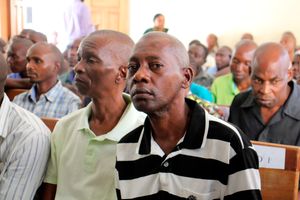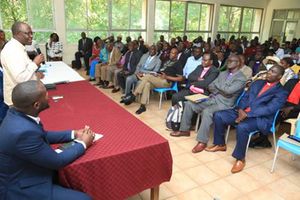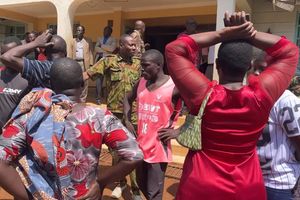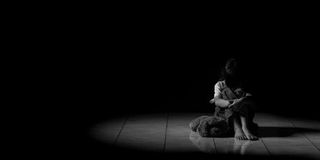
Many Shakahola child survivors suffer from complex grief and post-traumatic stress.
A psychologist has described the disturbing accounts of the psychological toll endured by children rescued from the Shakahola massacre—three years after they were saved from the deadly cult that controversial preacher Paul Nthenge Mackenzie is accused of running.
Testifying before Tononoka Children’s Court Principal Magistrate Nelly Chepchirchir, the clinical psychologist and play therapist painted a bleak picture of the trauma the children have carried since their rescue.
Dr Florence Mueni said that the minors exhibited classic signs of severe psychological distress caused by prolonged starvation, isolation, indoctrination, and the loss of close family members.
“The child experiences recurring nightmares and intrusive thoughts of witnessing people die. He expressed sadness when recalling the trauma, including being tied to a tree,” Dr Mueni stated, referencing one of the survivors.
She was among a team of mental health professionals who volunteered to support 13 children rescued from the Shakahola forest, after enduring horrific conditions under Mackenzie’s control.
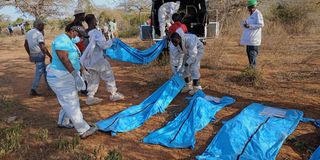
The exhumation exercise in Shakahola forest on June 5, 2024.
Dr Mueni told the court that during counselling sessions, the children spoke about being forbidden to mourn their loved ones who died of starvation, and that many suffered from complex grief and post-traumatic stress.
One of the most heart-wrenching cases involved a boy who witnessed his brother die right in front of him—a memory that left deep emotional scars.
“Some children showed fear, anger, shame, and a loss of interest in things they once enjoyed,” the expert said while being guided by prosecutors Jami Yamina, Betty Rubia amongst others.
She also explained how starvation and extreme isolation triggered a 'collapse response'—a trauma mechanism where the body shuts down under perceived danger or stress.
According to the witness, many of the children were initially unresponsive and visibly terrified, especially at the mere mention of Mackenzie’s name.
“Their fear was so pronounced, it was clear how deeply his influence had affected them. Over time, however, with consistent therapy and psychosocial support, most began to open up, heal, and return to school,” said Dr Mueni.
Dr Mueni's psychological assessment has since become a central piece of evidence in the case against Mackenzie and his 38 co-accused.
The defence team had tried to challenge the admissibility of her report, arguing that she lacked an updated annual licence under the Counsellors and Psychologists Act of 2016.
Through his lawyer Lawrence Obonyo, Mr Mackenzie sought] the rejection of the psychological report from prosecution evidence on grounds of licensing non-compliance.
Obonyo anchored the application on the Counsellors and Psychologists Act of 2016, which mandates that all practising counsellors must be licensed annually.
He contended that Dr Mueni did not possess a valid licence in 2023 when she prepared the document, rendering it inadmissible.
However, the prosecution, led by Mr Yamina, opposed the application, arguing that the expert report was submitted under Section 48 of the Evidence Act, which does not stipulate that expert witnesses must be licensed or gazetted to give testimony.
“Dr Mueni should not be penalised for the fact that, in 2023, the Psychologists and Counsellors Licensing Board was yet to properly operationalise and was yet to license any counsellor in the country,” he said.
The prosecution also cited transitional provisions under Section 46 of the Counsellors and Psychologists Act, which allow practitioners who were already in practice prior to the board’s full establishment to continue offering services until their licensing applications are either approved or rejected.
The court agreed with the prosecution, and rejected Mackenzie’s application, noting that Dr Mueni’s report, submitted under Section 48 of the Evidence Act, was valid.
The magistrate further agreed with the state that the licensing board was not fully operational in 2023 and transitional provisions allowed qualified practitioners to continue their work in the interim.
Chief Inspector Kigen Sawe and Senior Sergeant Livingstone Lihanda from the DCI’s Forensic Unit presented shocking images and video evidence from the Shakahola crime scene.
These included images of makeshift fasting huts, abandoned belongings, water pans, and rudimentary shelters—offering the court a chilling view into the lives Mackenzie’s followers were forced to endure.
Adding to the testimony, Principal Children’s Officer Sebastian Muli Muteti recounted how children rescued from the forest were frail, malnourished, and bore signs of physical abuse.
Working alongside local elders and the area chief, his team discovered four children who revealed the brutal punishments meted out to those who disobeyed.
According to the minors, Mackenzie’s followers, some of whom were armed, would beat and isolate anyone who questioned their orders—including children.
Muteti said the children described being confined in isolation, tied up, and in some instances, witnessing others being crucified for attempting to escape. Food was intentionally withheld, and even the youngest were not spared the suffering.
“My team bumped into four frail children dressed in dirty clothes with visible strokes marks on limbs and on the back deep in the forest. The children told us of harrowing account of systematic beatings and torture from Mackenzie's security guards,” he said
The court also heard from two school heads who confirmed the disappearance of students believed to have been taken to Shakahola.
Mtopanga Secondary School principal, Mr Omari Omari, testified that a girl from his school went missing in 2018 without ever receiving a formal transfer.
It was only years later—after the massacre was revealed—that detectives traced her records back to his school.
Similarly, Mr Mathew Maroko Samoita, a head teacher at a private school in Kisauni, told the court that a Grade Three pupil was withdrawn by his parents, who are now among those facing charges linked to child neglect and mistreatment.
Both teachers provided the court with documentation, including birth certificates and school reports, which identified the minors.
The children were among the more than 10 survivors who gave evidence against their own guardians, accusing them of subjecting them to cruelty, denying them education, and supporting the cult’s radical ideology.
Mackenzie and his co-accused face multiple charges, including child cruelty, psychological torture, and obstruction of education.

